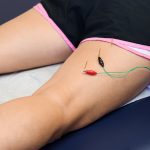PHC Physical Therapy and Rehab Services is dedicated to providing one-on-one, highly skilled, patient-centered physical therapy designed to support your recovery, wellness, and overall health. Our experienced therapists work closely with each patient to create personalized treatment plans that address pain relief, mobility improvement, and functional restoration. PHC PT is an essential part of recovery and wellness, as well as a key to your good health.
Physical Therapy
+ Rehab Services
Our Approach

Our Office
4 Physical Therapists
2 Physical Therapist Assistants
Located in Statesville
Meet Our Team

JEN

COLLEEN

LESLIE

LISA

SUMMER

HEATHER

CRYSTAL

ROSEANN
Our Location
Physical Therapy & Rehab Services
556 Kitchings Drive,
Statesville, NC 28677
704-872-0024 Phone
704-761-6984 Fax
OUR SERVICES
Physical Therapy (PT), also known as Physiotherapy, is one of the allied health professions that, by using evidence-based assessment, exercise, joint mobilization and health education, treats conditions such as chronic or acute pain, soft tissue injuries, arthritis, physical impairments and gait disorders typically of musculoskeletal, and neurological origins. Physical therapy is used to improve a patient’s physical functions through physical examination, diagnosis, prognosis, physical intervention, rehabilitation and patient education.
PT Services Include:
-
- Orthopedic
- Post Surgical Rehabilitation
- Injury Prevention
- Neurological Rehabilitation

Pelvic Floor Therapy
Millions of Americans suffer from pelvic floor dysfunction, yet for most, the symptoms go unidentified and untreated. Statistics say that one out of every five Americans suffer from pelvic floor dysfunction at some point in their life. The pelvic floor is made up of muscles in the lower abdomen, pelvis and perineum. These muscles form a sling and assist in supporting the abdominal and pelvic organs, as well as help bladder and bowel control and sexual activity. A physical therapist, specifically trained to treat pelvic floor dysfunction, will evaluate and treat any joint dysfunction, muscle tightness, muscle weakness or imbalance or nerve involvement affecting the function of the pelvic floor. They are trained to identify and develop an individualized treatment plan for each patient.

Certified Vestibular & Balance Therapy
Vestibular Rehabilitation (VRT) is a form of Balance Retraining Therapy. It has emerged over the past several years as an alternative treatment for patients with chronic non-resolved motion intolerance, visual sensitivity, and imbalance problems. We offer assessment and evaluation programs, balance retraining, and vestibular rehabilitation. With balance retraining and vestibular rehabilitation, our goal is to improve balance function and visual motor control, increase general activity levels, and help your body compensate for inner ear disorders.

Certified Dry Needle Therapy
Dry Needling (DN) is an effective treatment for acute and chronic pain. It can promote healing after injury and improves a patient’s ability to move with less pain. DN is a therapeutic treatment that involves inserting a very thin filament needle into a “trigger point” or muscle spasm that refers pain to a specific area of the body.It is a common misconception that dry needling is like acupuncture. Although the tool we use is similar in that it is a very thin needle, our evaluation process, treatment and goals of the technique are very different from acupuncture. Our therapists will evaluate your neuromuscular system (nerves and muscles) and treat specific muscle tissue with the overall goal of improving movement. Our physical therapists will fully evaluate the function of your neuromuscular system to determine what tissues are contributing to your painful limitations and apply the dry needling techniques to improve healing, decrease pain and increase your ability to perform activities without limitations.

TMJ Dysfunction Therapy
Temporomandibular joints (TMJ) are the joints that connect your jawbone to your skull. Your TMJ springs into action each time you talk, chew, and swallow. TMJ dysfunction is a disorder of the jaw joint and the muscles that surround it, causing discomfort and stiffness. This can be caused by a few things such as arthritis, a jaw injury, or overuse. Therapy for this disorder starts with assessing jaw mobility and then working to relieve neck and head muscle tightness.

Spine & Back Pain Therapy
Physical Therapy is one of the first treatments recommended for someone experiencing spine or back pain. Our Physical Therapists focus on exercises that strengthen the lower back muscles and condition the spinal tissues & joints.
FREQUENTLY ASKED QUESTIONS
The treatment of disease, injury, or deformity by physical methods such as massage, heat treatment, and exercise rather than by drugs or surgery.
A provider referral is not mandatory. However, most health plans require a referral to be eligible for insurance.
What is pelvic floor physical therapy?
Pelvic floor PTs specialize in treatment of orthopedic and pelvic pain, pregnancy/postpartum related aches and issues, and pelvic floor disorders impacting bowel, bladder and sexual function.
How long are appointments?
At Piedmont HealthCare Physical Therapy we have 45 to 60 minute evaluations and private treatment sessions. We ask that you arrive 30 min early to your first appointment to complete registration paperwork.
What should I wear to my appointment?
Please wear comfortable clothing to your appointment. We typically assess your movement, posture, strength and flexibility.
Can I bring someone along with me to my appointment?
Yes, you are welcome to bring a supportive friend, loved one, or even a new baby to your appointment.
What can I expect to happen at my initial visit?
We will review your medical history and concerns. There are no silly questions or embarrassing points to share. Your discussion is confidential and we want you to share as openly as comfortable on day one. We will ask questions regarding your symptoms, spend time reviewing pelvic anatomy and discuss our exam of the pelvic floor. Each part of the exam is optional and you provide consent prior to any assessment.
Should I reschedule my exam if I am menstruating?
It is not necessary to reschedule if you are on your menstrual cycle. If you are not comfortable with a pelvic exam during menstruation we can always change the direction of our session to work outside the pelvic cavity while continuing to progress toward your goals.
Will the therapist complete a pelvic exam at the first appointment?
It depends. Our team at Piedmont Healthcare Physical Therapy has extensive experience in orthopedics and this is important. Your pelvic floor does not float in space and it is important for us to look at the surrounding structures to gain perspective of the big picture. We will often look at your posture, watch you move, test your strength and look at your abdomen. Depending on your symptoms and your comfort level we will examine your pelvic floor muscles.
Remember that you are in control of the session the entire time and we will work with you, at your pace, to achieve your goals.
Why did my provider send me for vestibular rehabilitation?
Vestibular Rehabilitation is utilized to treat a variety of disorders. You will likely be referred for Vestibular Rehabilitation if you are dizzy, experiencing imbalance, disequilibrium, stroke, concussion or have had an illness related to your brain or inner ear.
What should I expect during the initial evaluation?
Your evaluation will take about one hour and will vary greatly based in your symptoms and diagnosis. The Physical Therapist will work one-on-one with you to discuss your symptoms and problems. Throughout the interview process, your evaluation with be personalized to be able to determine a diagnosis and treatment plan. The evaluation with consistent of some eye and visual testing, balance testing, coordination testing and observing gait and mobility. Specialized positional testing may be utilized if positional vertigo (BPPV) is suspected. Treatment will likely be initiated on your first visit and you may be expected to complete some home exercises. You will work closely with your Physical Therapist to create a plan that will work for you and your schedule.
Should a family member or friend bring me to the appointment? Will I be dizzy afterward?
If you are dizzy all the time, it is certainly not recommended you drive. If one of your symptoms is room spinning dizziness, it is recommended to have someone drive you to and from your appointment for your comfort, but this is not completely necessary if you need to drive yourself. You will likely leave your appointment feeling better than when you arrived.
How long will I have to come to vestibular rehabilitation?
We schedule one-on-one visits for one hour each session. The duration of your care varies based on diagnosis, participation with home exercises, prognosis and progress while under our care. Typically, Physical Therapy treatment cycles last from 3-6 weeks. This plan will be discussed and agreed upon between you and your Physical Therapist.
Dry Needling: What is it?
Dry needling is a safe, effective treatment technique physical therapist (certified in the procedure) use to treat pain and movement impairments. The physical therapist inserts a “dry” thin monofilament needle, one without medication or injection, into a trigger point within a tight muscle.
Dry Needling vs. Acupuncture:
Dry needling is not acupuncture, it uses similar tools, but that is where the similarities end. Dry needling is based on modern Western medicine and evaluation of pain patterns, posture, movement impairments, function and orthopedic testing, and is supported by research. Acupuncture is based on traditional Chinese medicine, and restoring proper energy flow through the body. Dry needling treats muscle tissue, and its goal is to reduce pain, inactivate trigger points and restore function.
What is a trigger point?
A trigger point is a local contracture of tight muscle fibers that disrupt function, restrict range of motion, refer pain, or cause local tenderness.
What can Dry needling be used for?
Dry needling can be used for a wide range of musculoskeletal issues (shoulder, neck, back, hip pain), and research indicates that it is a safe and effective approach for treating and managing pain.
Will my insurance cover Dry Needling?
Some insurances do cover dry needling, but some may not reimburse for the procedure. You may want to contact your insurance company to determine if your individual plan covers the service, but you may elect to pay an out-of-pocket fee to receive dry needling.
What are the benefits of dry needling?
What are the cons or complications of dry needling?
How long does the procedure take?
Research varies on the time frame of needle insertion; however, plan for it to take 15-30 minutes as part of your treatment session. Dry needling will be used in conjunction with other physical therapy treatment techniques in order to help meet your individualized needs.
What are the benefits of Dry Needling with E-stim?
Dry Needling is effective on its own, but the addition of E-stim helps to expand the needles effect on the muscle, by stimulating blood flow and increasing analgesic effects of the pain.
You will be evaluated for mandibular (jaw) movement, and strength. We will look at your functional issues during your day and possibly night. Posture and habits will be assessed and discussed.
A cervical spine (neck) screen is done for any motion and dysfunction that may arise in this part of the body. The neck and facial muscles are interdependent. Any problems with the upper quadrant (head, neck, shoulders) will be addressed with your evaluation.
Typically exercises are given along with written instruction for habits to avoid, and foods to at least temporarily avoid.
The goal with physical therapy is to help you to become more aware of poor postures and habits which could impact the TMJ’s, along with treating the imbalances and dysfunctions that you may have with the muscles and joints. Typically, this will decrease pain and improve movement patterns.
Independence with the home exercises and self-care is imperative.
Yes, we do offer Aquatic Therapy! This form of physical therapy takes place in a pool, where the natural buoyancy of water reduces stress on joints while gentle resistance helps improve strength, flexibility, and balance. It’s especially beneficial for patients recovering from surgery, managing arthritis, or seeking a low-impact exercise option.
